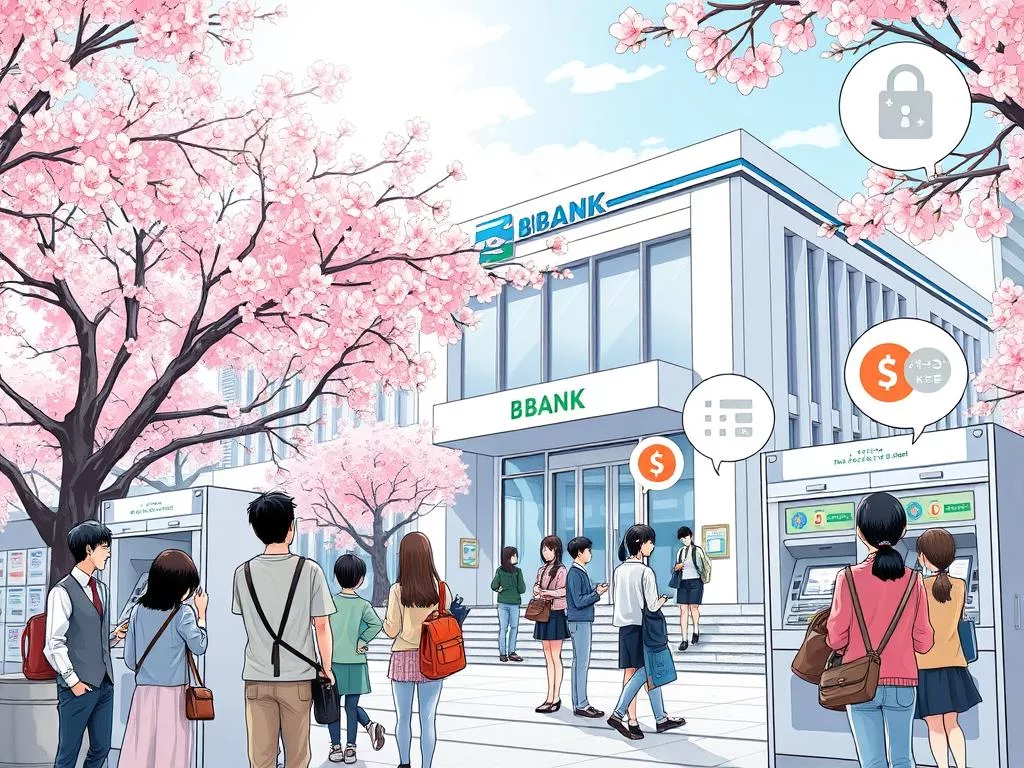Moving to Japan as a foreigner means dealing with many official tasks. One key task is getting a bank account. It makes daily tasks like paying rent and getting your salary easier. This guide will help you understand how to open a bank account in Japan.
Why You Need a Bank Account in Japan
Having a bank account in Japan is key for anyone living or working here. The main benefits of a Japanese bank account include getting paid directly. Most jobs in Japan pay through direct deposit, making it easier and faster for everyone.

For foreigners, managing money daily is another big plus. Landlords and companies need a Japanese bank account for rent. It also helps with bills, shopping, and other money matters.
There are many types of bank accounts in Japan, like savings and time deposits. Time Deposits have better interest rates. Foreign Currency Accounts are great for international money moves.
Banks like Shinsei and SMBC Prestia offer services in English, which helps foreigners. Japan Post Bank is also good for expats, with lots of services and a big network. Starting a bank account can cost as little as ¥1,000, making it easy to begin.
Knowing the perks of a Japanese bank account helps a lot when moving to Japan. It makes managing money easier, from everyday tasks to sending money abroad.
| Account Type | Description | Benefits |
|---|---|---|
| Ordinary Savings Account | Basic account for daily transactions. | Easy access, no minimum balance requirements. |
| Time Deposit Account | Account with higher interest rates locked for a specified period. | Higher interest rates. |
| Foreign Currency Account | Allows holding foreign currencies. | Convenient for international transactions. |
In short, for expats, knowing about Japanese bank accounts is vital. It makes managing money in Japan easier and helps ensure a smooth life abroad.
Eligibility and Requirements
When opening a bank account in Japan, expatriates must know the rules. Most Japanese banks ask for six months of living in Japan. But, some exceptions are made for urgent needs like jobs or internet services.
Japan Post Bank is a quick choice without a residency rule. It’s great for those in a hurry. It also has many branches, even in rural areas, and offers services in several languages.
Knowing what you need for a bank account in Japan is key. You’ll need to show certain documents and meet strict rules. You must apply in person at the bank. You’ll need:
- A valid passport
- Residence card
- Personal seal (hanko) or signature
- Proof of address (utility bill or residence certificate)
- Initial deposit (typically 1000 yen)
For better banking, check out SBI Shinsei Bank and Rakuten Bank. SBI has English support online. Rakuten lets you open accounts online and offers many bank cards. Both have good rates for sending money abroad.
Getting a credit card is easy with a bank account. You can get VISA, Mastercard, JCB, and AMEX. But, you need a job and a good salary. You must pay your credit card bill every month.
Opening a corporate bank account is straightforward. You need to fill out a form, show ID, and provide company documents. The bank will check your application in one to two weeks. If you don’t speak Japanese, you can get help from an interpreter.
Step-by-Step Guide to Open Bank Account in Japan as a Foreigner
Opening a bank account in Japan as a foreigner might seem hard. But, with a clear plan, it’s easy. This guide to open bank account in Japan helps you get ready for each step.

- Residency Duration: Most banks need you to live in Japan for at least 6 months. But, Japan Post Bank doesn’t require any residency for foreigners.
- Required Documents: You need the right papers. You’ll need:
- A valid residence card (在留カード – Zairyu Kaadoo)
- Passport
- My Number card (マイナンバーカード – Mainanbaa Kaado)
- Proof of address, like temporary residence papers or utility bills
- Selecting the Bank: Pick a bank that fits your needs. Mizuho Bank, Mitsubishi UFJ Bank (MUFJ), Sumitomo Mitsui Bank (SMBC), and Shinsei Bank offer some English help. Japan Post Bank has limited English support.
- Types of Accounts: Know the different accounts:
- Regular Savings Account (普通預金 – Futsu Yokin)
- Time Deposit Account (定期預金 – Teiki Yokin)
- Current Account (通帳預金 – Tsucho Yokin)
- Foreign Currency Account (外貨預金 – Yokin)
- Joint Account (共同預金 – Kyodo Yokin)
- Corporate Account (法人口座 – Hojin Konto)
- Internet-only Accounts
- Application Submission: Go to the bank with your papers to apply. Most banks take a few days to a week to process your application.
After applying, it takes 5-10 business days to get your ATM card. Also, some banks might ask for an initial deposit, depending on the account type.
If you often send money abroad, think about a Wise multi-currency account. It can save you money on international transfer fees. Adding Wise to your Japan banking guide can help with currency conversion and lower fees.
Best Banks for Foreigners
Finding the right bank in Japan as a foreigner can be tough. The language barrier and banking system are different. But, some banks are very welcoming to non-Japanese speakers. Shinsei Bank, SMBC Trust Bank, Sony Bank, WISE, Japan Post Bank, Rakuten Bank, and PayPay Bank are top choices for expats.
Shinsei Bank is great for English services, including online banking. There are no monthly fees and many currency options. SMBC Trust Bank also serves English-speaking customers well, with top-notch service and support.
Sony Bank, WISE, and Rakuten Bank have strong English interfaces. Sony Bank has fast online banking. WISE is known for low fees on overseas transfers. Rakuten Bank has high approval rates for online credit cards, making it easy for new customers.
Japan Post Bank is loved for its wide ATM network, with many open 24/7 and in English. PayPay Bank is perfect for tech lovers, with easy online and mobile banking. These banks make banking in Japan easier for foreigners. For more details, check out the Essential Guide to ATMs in Japan.

